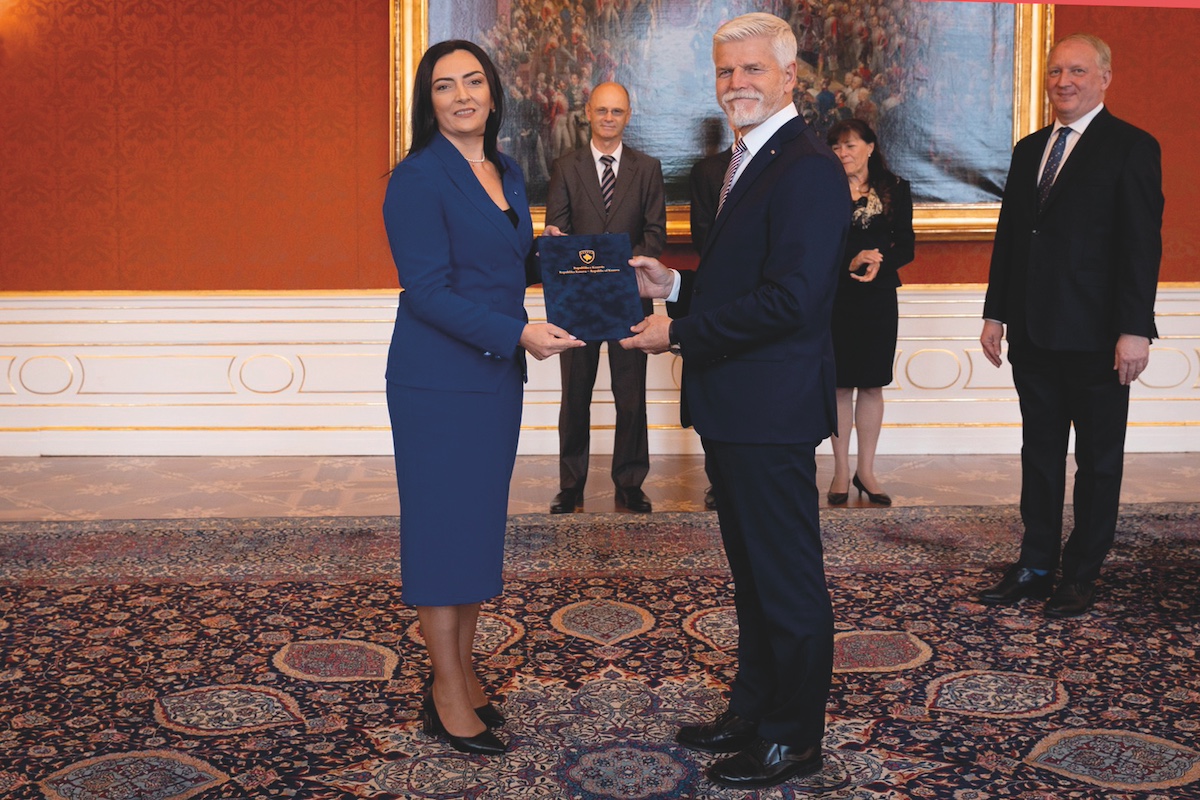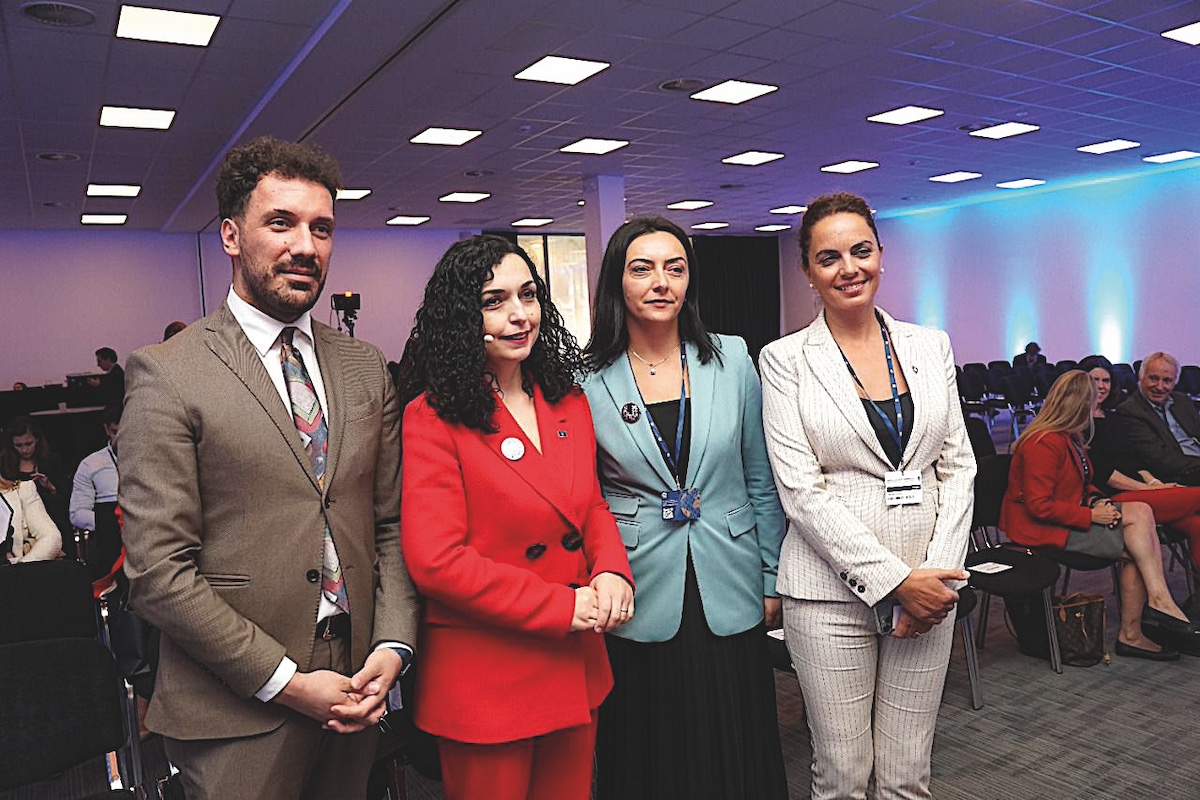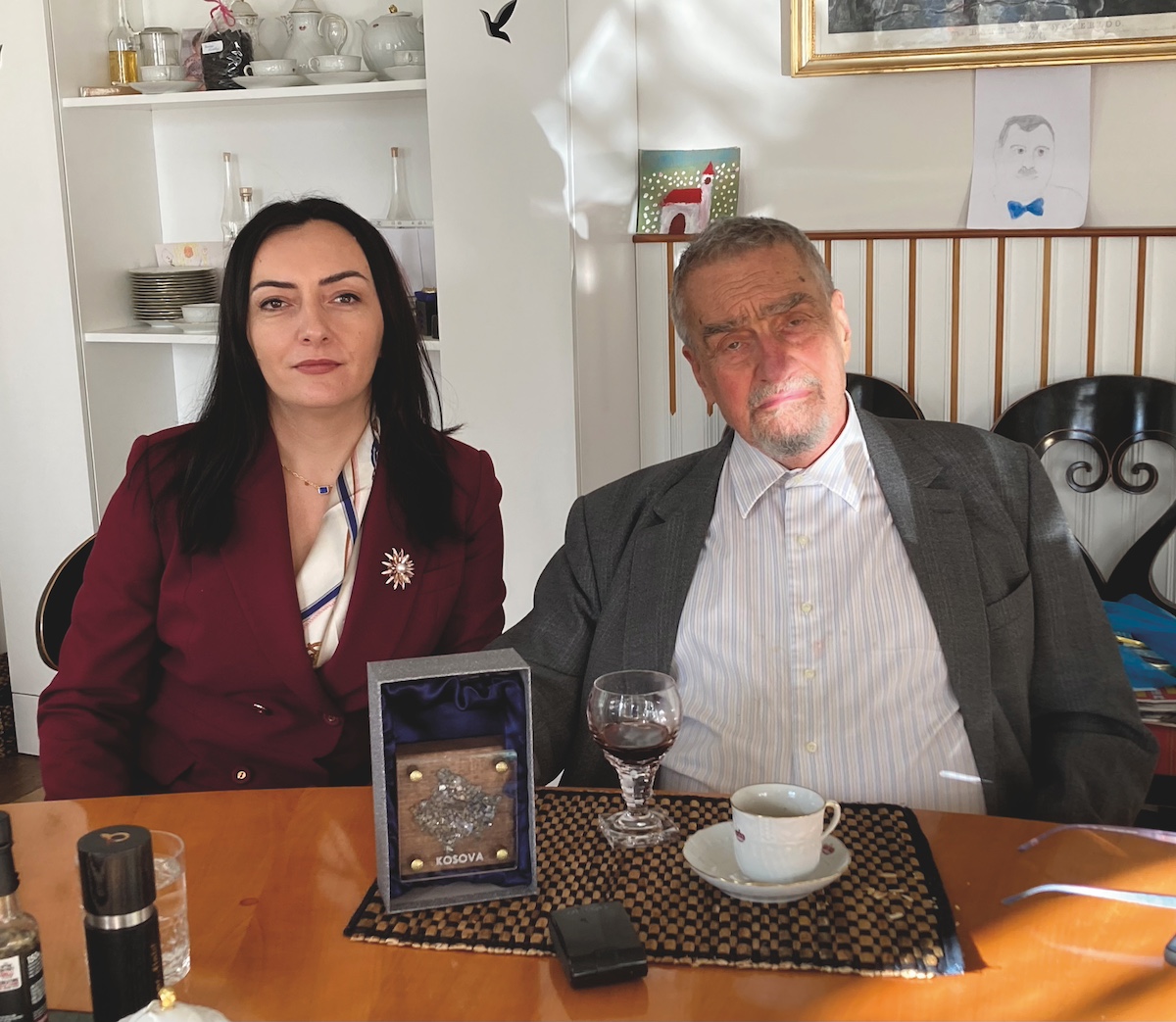“Euro-Atlantic integration remains the strategic orientation of my country”

H.E. Ms. Albesjana Iberhysaj-Kapitaj, Ambassador of Kosovo submitting letter of credentials to the Czech President Petr Pavel
Text: Martina Hošková, M.Zisso; Photo: Archive
“At the age of 16, the Republic of Kosovo stands as the most pro-EU country in the region and beyond, with over 95% of our citizens expressing an unwavering desire to join the European Union,” declares H.E. Ms. Albesjana Iberhysaj-Kapitaj, the first Ambassador of Kosovo in Czechia. She further emphasises: “Kosovo is committed to actively pursuing our independence and democracy and integrating into the European Union and NATO, while fostering a profound friendship with the USA.”
Can you please introduce yourself to our readers?
I am a career diplomat who was lucky enough to join the diplomatic service 15 years ago, just a few months after the establishment of the Ministry of Foreign Affairs. Being a lawyer profiled in international relations coupled with a Master’s degree in French language and literature, I embarked on my diplomatic journey in the Department for Legal Affairs and International Agreements. The initial years of my career were undeniably golden, providing invaluable personal experience and significance for both the institution and my young country, which had only declared its independence a year prior.
What was some of that valuable experience collected during those early years?
Those early years were marked by colossal and intense work undertaken alongside my colleagues at the ministry, filled with great pleasure and, above all, immense pride. From the beginning, we constituted the foundations of a pivotal department tasked with crafting the initial legal framework, from drafting laws to conducting exchanges of verbal notes. It’s worth noting the privilege of collaborating with a director from whom I learned a lot. Additionally, I must underscore the invaluable support extended by our international allies, particularly the Americans, who generously shared their expertise with us. Throughout that period, I seized the opportunity to attend advanced diplomatic courses offered by prestigious academies such as the Diplomatic Academy of Vienna, the National School of Administration/ENA, and the Clingendael Institute of the Netherlands, among others.
How many countries have you served in up until now?
The Czech Republic is the third country I have served in so far. I commenced my first foreign assignment at our Embassy in Paris as a Counsellor. Alongside diplomatic duties, I also undertook the crucial responsibility of operationalizing Kosovo’s visa system for countries under the visa regime.
After a few months of service in Paris, at the suggestion of the Ministry, I transitioned to the General Consulate in Strasbourg. For us, it represented the foundational unit of our forthcoming permanent mission at the Council of Europe. As Kosovo’s membership in this significant international organisation, renowned as the guardian of human rights, stands as a priority for us this year, I would like to express the following:
The Republic of Kosovo’s full membership in the Council of Europe (CoE) is imperative to strenghten the protection of human rights and the well-being of citizens without discrimination. Hence, I take this opportunity to extend my gratitude to the countries that supported our successful first phase of membership last year and kindly ask member states to back us through their representatives in the CoE, aiming to bring the ongoing process to a successful conclusion.
Most recently, after a year of returning to Pristina, where I served as the head of the Department for Legal Issues and Treaties, I assumed a position in New York. At the Consulate General of the Republic of Kosovo in New York (2020-2022), I served as the Deputy Head of Mission. Aligned with the country’s strategic objectives, I focused on enhancing visibility and engagement with the United Nations, coordinating the Security Council’s periodic reporting agenda, and fostering relations with Permanent Missions accredited to the UN.
Both missions, in Strasbourg and New York, were a special experience professionally and personally. The experience gained in multilateral missions, where the primary work is the advancement of relations with the states represented in the organisation, is unique.

H.E. Ms. Albesjana Iberhysaj-Kapitaj, Ambassador of Kosovo together with Dr. Vjosa Osmani-Sadriu, President of the Republic of Kosovo at the forum 2000
INTERVIEWS
Tell us about your country.
It’s a privilege and honour to represent Kosovo in a welcoming nation like the Czech Republic. Known as the land of the youngest Europeans, Kosovo epitomises exceptional talent, and unwavering European fervour. Despite the scars of war that once ravaged our land, Kosovo has risen to become one of the most vibrant democracies in the region. With the support of our friends and allies, the Republic of Kosovo has consolidated its democratic institutions and elevated its international subjectivity as a trustworthy and committed partner to democracy, human rights, and liberal democratic values. At the age of 16, the Republic of Kosovo remains the most pro-EU country in the region and beyond, with over 95% of our people expressing their uncompromising desire to join the EU. Euro-Atlantic integration remains the strategic orientation of my country.
As a young nation, we proudly celebrate the tenure of our second female president, alongside a record of two women serving as deputy prime ministers, one of whom also holds one of the five ministerial positions held by women. Moreover, our parliament boasts 43 female members, with 34 of them elected without the need for quotas. This marks a historic achievement, with women occupying nearly 40 percent of the total parliamentary seats.
For potential foreign investors, Kosovo offers an environment rich with highly talented, techsavvy, and multilingual youth, with 70% of the population under the age of 35. Our nation boasts a low and fiercely competitive tax system, coupled with a modern legal infrastructure aligned with EU legislation. Kosovo leads the region with the highest rate of internet users, with 93% of the population having access, propelling the ICT sector to remarkable heights. A testament to our skilled youth, particularly in the ICT sector, is the success story of hightech company Gjirafa, a fusion of Kosovo talent and Czech and US investment.
Today, Kosovo is not merely taking steps but rather leaps toward democratisation, as recognized by international indexes in areas such as the rule of law and transparency. In essence, Kosovo is showcasing its transformative spirit to the world across various sectors, including the economy and beyond.
What was your path to becoming the Ambassador of Kosovo?
My journey to becoming the Ambassador of Kosovo was deeply influenced by my early interest in international politics, which manifested itself from a young age. Even as my peers pursued different interests, I found myself drawn to following news editions, much to the amusement of some friends.
My childhood was spent enduring the challenges of living under the regime of Serbia, where opportunities were scarce, and isolation from the rest of the world was pervasive. School buildings catered primarily to the Serbian community, leaving us, the Albanian majority, to endure lessons in overcrowded classrooms with shortened schedules and inadequate resources. At that time, my country, my community, did not have ambassadors to represent us – even in local institutions, the representation was done by others for us. Being under constant repression, our only option was strengthening ties with powerful countries, with friendly countries such as the USA and European democracies.
Our aim was to establish strategic alliances with democratic countries who listened to our concerns, and, as they proved, were ready to help us gain our freedom.
Guided by the motto ‘An independent, democratic, integrated Kosovo in the European Union and in NATO, in permanent friendship with the USA,’ our esteemed leader Ibrahim Rugova, and the peaceful movement he championed, paved the way for Kosovo to forge meaningful friendships and powerful alliances. Through our liberation war, following the NATO intervention to put a halt to Serbia’s war crimes, crimes against humanity and genocide against the people of Kosovo, and the support of the democratic world, we achieved our goal of freedom and independence.
What truly inspired my path toward diplomacy was the desire to bolster the international presence of my country and garner support from friendly nations like the Czech Republic. Additionally, I was driven by the goal of advancing Kosovo’s Euro-Atlantic integration and fostering strong bonds between our two nations.

H.E. Ms. Albesjana Iberhysaj-Kapitaj, Ambassador of Kosovo with Karel Schwarzenberg, former Minister of Foreign Affairs of Czechia
Can you share some of your diplomatic work highlights?
Undoubtedly, my two-year tenure in the Czech Republic has been an exceptional experience. Diplomatic engagement in Czechia is dynamic, underpinned by a steadfast commitment to democracy and human rights. Notably, we closely monitored the Czech presidency of the European Union, during which I commend our Czech friends for their successful presidency.
It was during the Czech presidency of the Council of the European Union that we achieved a breakthrough in the protracted visa liberalisation process for Kosovo. This achievement was largely due to the commitment and strategic vision of the Czech government for the future of the European Union. Consequently, we entrusted Kosovo’s application for EU membership to the Czech Presidency, marking a historic stride toward our integration into the European Union.
Additionally, we closely observed the Russian aggression against Ukraine. In this context, we admire the unequivocal support of the government of Petr Fiala for Ukraine, including its commendable efforts in welcoming a record number of refugees.
What is the most difficult part of being a diplomat?
The most challenging aspect of being a diplomat lies in the profound impact it has on our families. While diplomacy offers numerous opportunities and privileges, it also entails immense responsibility. Our assignments and relocations affect not just us, but our families too, particularly our spouses, who often make sacrifices in their own careers to support us. I am fortunate to have a supportive husband and children who stand by me during my missions abroad, facilitating my commitments. Despite the benefits of forging new connections, the constant upheaval of relocating poses a significant challenge for us all.
How do you spend your free time?
As an ambassador, my role often demands a significant portion of my time and attention, given the responsibilities associated with representing my country and fostering diplomatic relations.
Despite the demanding nature of my position, I am passionate about reading. While my schedule may be hectic, I prioritise time for reading, which serves both as a leisure activity and a professional pursuit. Specifically, I am drawn to books with themes rooted in international relations, geopolitics, and current events. Exploring this kind of literature not only enhances my understanding of global affairs but also enriches my perspectives as an ambassador. Beyond reading, I cherish opportunities to explore historical sites and immerse myself in nature. Prague, with its rich history and abundance of museums, offers a myriad of cultural experiences. Yet, it’s not just Prague; other cities like Český Krumlov, Karlovy Vary, and Liberec have captivated me with their natural splendour and fascinating histories.
What is the current status of Czechia – Kosovo relations? You have already worked in the Prague Kosovo Embassy for some years, but only became an ambassador a few months ago. What has changed?
I proudly emphasize that the Czech Republic was one of the first countries to recognize the independence of Kosovo, just three months after the Declaration of our Independence.
Czechia remains dedicated to facilitating Kosovo’s membership in international organizations and integration into Euro-Atlantic institutions. Over the years, bilateral relations between our countries have flourished, evident in the heightened frequency of official visits and the unwavering support from across the political spectrum in both nations.
Furthermore, we observe a growing dynamism in economic exchanges and people-to-people contacts, underscoring the depth and breadth of our partnership.
It was during the Czech Presidency of the European Union Council that the commitment and strategic vision of the Czech government paved the way to finally conclude the protracted visa liberalization process for Kosovo, a milestone for which we will always be grateful. Consequently, it was under the Czech Presidency of the EU that we entrusted the submission of Kosovo’s application for membership in the European Union, symbolising a historic stride toward our European future.
While the relations between our countries have evolved over the years, the bilateral relationship between Kosovo and the Czech Republic has been marked by a specific dynamic due to opposing attitudes towards Kosovo’s independence from former Czech Presidents. Their divergent positions created challenges that hindered the elevation of diplomatic representation to an Ambassadorial level between our two nations.
Due to these challenges surrounding the opposing attitudes towards Kosovo’s independence, I was initially accredited as Charge d’ Affaires en pied until October 7th of last year. On that significant date, I had the honour of submitting my letter of credentials to President Pavel, whose invaluable support enabled me to become the first accredited Ambassador of Kosovo in the Czech Republic. This accreditation marked an extraordinary moment of pride, manifesting a significant milestone in our bilateral relations. Today, I am proud to assert that our bilateral relations are historically at their peak, reflecting the mutual dedication and collaboration between our two nations.
Can you share some of your impressions of becoming the first accredited Ambassador of Kosovo in Czechia?
Becoming the first accredited Ambassador of Kosovo in Czechia was an immensely historic and emotional moment for me. The handover ceremony, along with the Czech protocol, was truly magnificent. I extend my heartfelt gratitude to all the staff involved in organising the ceremony, both from the office of President Pavel and from the Ministry of Foreign Affairs. I am deeply thankful to everyone who attended the ceremony and offered their support. The warmth and smiles on the faces of those present, as captured in the photos from that day, demonstrated their shared emotions and support during this significant occasion. I want to express my sincere appreciation publicly to all involved and commend the flawless organisation of the ceremony. It was a moment I will cherish forever, marking a new chapter in the diplomatic relations between Kosovo and Czechia.
This interview is done on the occasion of your national day. What are you wishing for your country? And for the Czech Republic?
As we approach the celebration of February 17th, 2008, a pivotal day in the history of Kosovo, marked by a new era for our people, I reflect on the remarkable journey that has brought us to where we stand today. On this important occasion, we honour our past, recognizing the determination, perseverance, and liberation struggle of our people, which paved the way for the emergence of a sovereign, democratic, and multi-ethnic state.
Our independence was achieved through the unwavering belief in our right to self-determination, statehood, freedom, and democracy, supported by our friends and allies, including the Czech Republic. To all our compatriots, I extend warm wishes for a joyous Independence Day, filled with the hope for new successes and achievements.
To our esteemed Czech friends, I express heartfelt gratitude for their steadfast support and partnership. I am proud and honoured to serve in the Czech Republic, witnessing the deepening of our bilateral and multilateral cooperation across diplomatic, economic, and people-to-people spheres.
I am confident that the enduring partnership between the Republic of Kosovo and the Czech Republic will continue to flourish and thrive in the years ahead.

